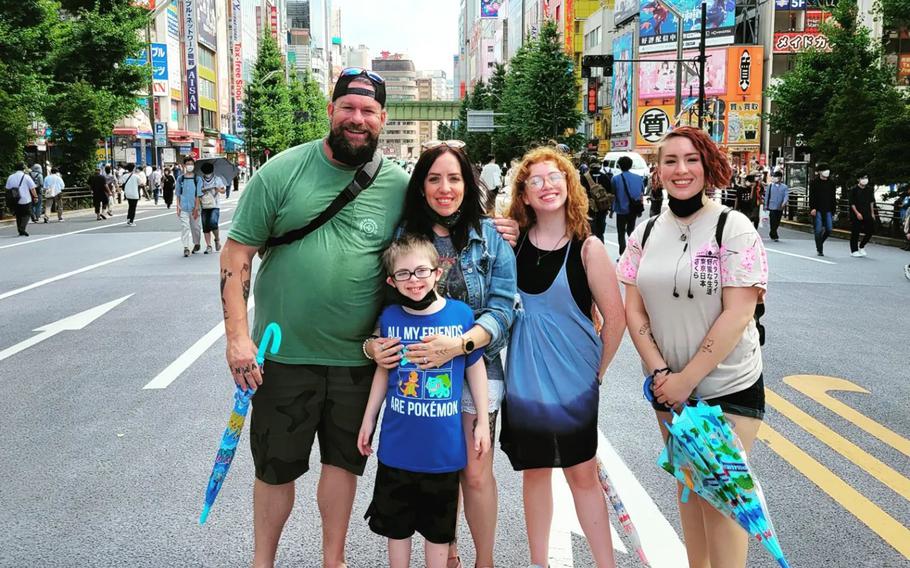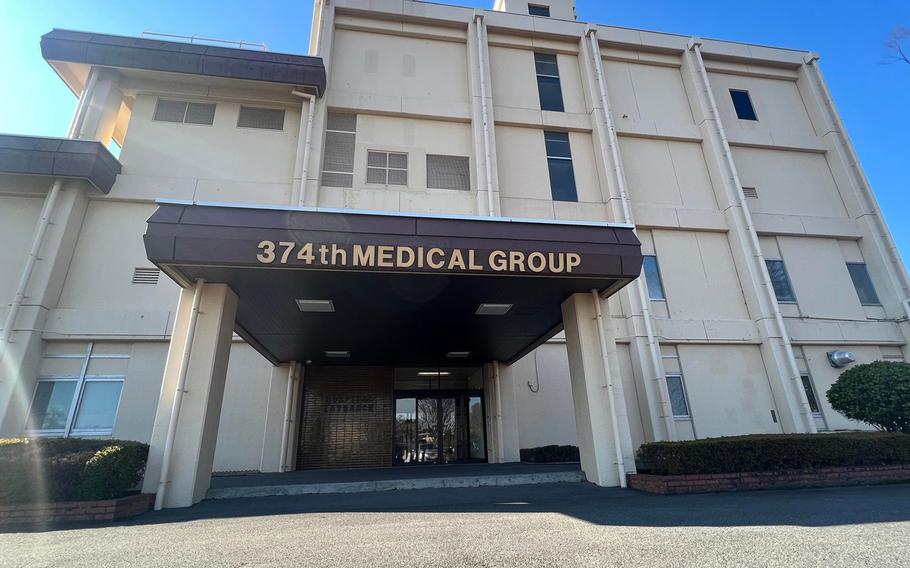
The McMahon family in Tokyo, Japan, on July 17, 2022. (Jordan McMahon)
YOKOTA AIR BASE, Japan — Jordan and Denise McMahon and their three children said they are returning to Albuquerque, N.M., just six months after they arrived at this air base, where Jordan works for U.S. Forces Japan.
“We uprooted our whole life,” McMahon, 44, told Stars and Stripes on Dec. 23. “I never in a million years, if we knew what the medical care situation was going to be like, would we have come here?”
The McMahons are among thousands of Defense Department civilian employees in Japan that U.S. Forces Japan said recently should expect only “space available” appointments at base medical facilities for routine health care starting with the new year.
In October, the Defense Health Agency announced that DOD civilian employees in the Indo-Pacific region should “have a plan in place” for medical care from a local provider in the event military hospitals lack the capacity to see them.
U.S. civilian employees of Stars and Stripes Pacific in Japan fall into this category.
The law prioritizes health care at military health care facilities for service members and their families covered by Tricare Prime, the military’s health care plan for active-duty families overseas, the director of DHA Region Indo-Pacific, Army Maj. Gen. Joseph Heck, said at the time.
At Yokota Air Base, an airlift hub and USFJ headquarters in western Tokyo, the 374th Medical Group on Aug. 1 limited most pediatric care to active-duty families. Next, Yokosuka Naval Base, the homeport south of Tokyo of the Navy’s 7th Fleet, told DOD civilians there Oct. 17 to seek routine health care off-base.

The 374th Medical Group at Yokota Air Base, Japan, on Dec. 28, 2022. (Kelly Agee/Stars and Stripes)
As of Sunday, health care providers at bases across Japan may schedule appointments for DOD civilians on space-available basis only, according to the USFJ announcement Dec. 23 on its official Facebook page.
“Beginning January 1 all Military Treatment Facilities within the Indo-Pacific will offer Space Available care in Family Medicine, Internal Medicine, Pediatrics, and Gynecology when excess capacity exists after meeting federal statutes governing access to care for active-duty Service Members and TRICARE Prime enrolled patients,” the post stated.
Space-available appointments are available on a same-day basis and are not guaranteed, according to the USFJ announcement.
In a comment posted Monday on the USFJ announcement, Stephanie Gilbert, an Air Force spouse, said the earliest she can book an appointment with a provider at Yokota’s 374th Medical Group is mid-January.
“I’m an active-duty dependent on Tricare Prime at Yokota, walking around with my jaw not being able to open more than an inch, and the next available appointment for me isn’t until (the) middle of January,” she said.
But she sympathized with the DOD civilians now expected to find health care elsewhere in Japan.
“In what world is there ever going to be space-available for non-prime patients?” Gilbert asked. “This seems like a back-handed way to say, ‘We don’t actually care about access to healthcare for those who we send overseas.’ This policy is not for the people.”
The Japan Civilian Medical Advocacy group, a group of DOD civilian employees, responded to USFJ with its own Facebook post Dec. 23.
“What a time to be alive — you inform thousands of patients they will no longer have access to routine or chronic care nor access to future appointments in an infographic 2 days before Christmas,” the post states.
The group advocates for civilians and their medical needs. It found at least 70 cases in 2022 where DOD civilians were denied care by military and Japanese providers, according to an Excel spreadsheet posted on the group’s Facebook page.
The advocacy group launched a petition Oct. 10 named “DOD Civilian Families in a Healthcare Crisis,” asking lawmakers to preserve civilians’ access to routine health care at military hospitals and protect them from denials by off-base providers. The 374th Medical Group has scheduled a town hall on the subject at 4:30 p.m. Thursday at the Yokota Enlisted Club.
McMahon, a former career Marine, and his family are covered by Tricare, not Tricare Prime.
He said he accepted the position in March and he and his family, including Denise McMahon, 40, and their children, ages 12, 13 and 18, arrived in Japan on July 4.
“We came here with the assumption and with the knowledge that our family was going to be able to be seen by practitioners on the base at the Yokota treatment facility,” he said.
That changed Aug. 1 when routine services and management of chronic medical conditions in Yokota’s pediatric clinic were limited to Tricare Prime enrollees. The McMahon’s youngest child, Gavin, has Down syndrome, his parents said.
“We can’t continue to live here,” McMahon said. “I can’t stay here and have them here for the next year knowing that our son might get sick.”